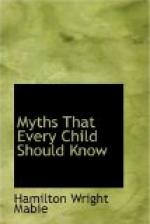On a platform, within full view of the balcony, sat the mighty King Polydectes, amid his evil counsellors, and with his flattering courtiers in a semi-circle round about him. Monarch, counsellors, courtiers, and subjects, all gazed eagerly toward Perseus.
“Show us the head! Show us the head!” shouted the people; and there was a fierceness in their cry as if they would tear Perseus to pieces, unless he should satisfy them with what he had to show. “Show us the head of Medusa with the snaky locks!”
A feeling of sorrow and pity came over the youthful Perseus.
“O King Polydectes,” cried he, “and ye many people, I am very loath to show you the Gorgon’s head!”
“Ah, the villain and coward!” yelled the people, more fiercely than before. “He is making game of us! He has no Gorgon’s head! Show us the head if you have it, or we will take your own head for a football!”
The evil counsellors whispered bad advice in the king’s ear; the courtiers murmured, with one consent, that Perseus had shown disrespect to their royal lord and master; and the great King Polydectes himself waved his hand, and ordered him, with the stern, deep voice of authority, on his peril, to produce the head.
“Show me the Gorgon’s head, or I will cut off your own!”
And Perseus sighed.
“This instant,” repeated Polydectes, “or you die!”
“Behold it then!” cried Perseus, in a voice like the blast of a trumpet.
And, suddenly holding up the head, not an eyelid had time to wink before the wicked King Polydectes, his evil counsellors, and all his fierce subjects were no longer anything but the mere images of a monarch and his people. They were all fixed, forever, in the look and attitude of that moment! At the first glimpse of the terrible head of Medusa, they whitened into marble! And Perseus thrust the head back into his wallet, and went to tell his dear mother that she need no longer be afraid of the wicked King Polydectes.
CHAPTER VI
THE DRAGON’S TEETH
Cadmus, Phoenix, and Cilix, the three sons of King Agenor, and their little sister Europa (who was a very beautiful child) were at play together, near the seashore, in their father’s kingdom of Phoenicia. They had rambled to some distance from the palace where their parents dwelt, and were now in a verdant meadow, on one side of which lay the sea, all sparkling and dimpling in the sunshine, and murmuring gently against the beach. The three boys were very happy, gathering flowers, and twining them into garlands, with which they adorned the little Europa. Seated on the grass, the child was almost hidden under an abundance of buds and blossoms, whence her rosy face peeped merrily out, and, as Cadmus said, was the prettiest of all the flowers.




